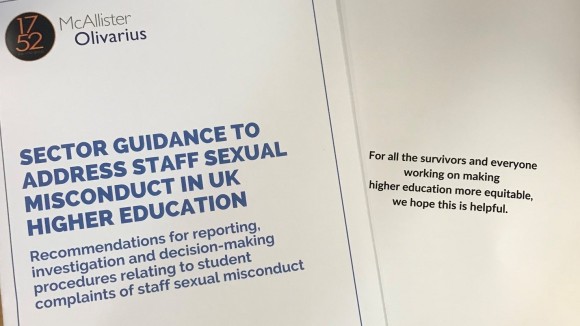As well as our own publications, we have been awarded several research grants for collaborative projects that address different aspects of staff- sexual misconduct. Our research is designed to inform changes in the higher education sector around prevention, education, and culture change.
Funded research
“Developing an intersectional approach to training on sexual harassment, violence and hate crime” HEFCE Catalyst Fund Tackling hate crime and online harassment on campus 2017-2018 (University of York)
We have partnered with Professor Vanita Sundaram (Project Lead) at the University of York and Professor Alison Phipps at the University of Sussex on a project that will enable the creation of pioneering guidance for more intersectional models of disclosure and bystander intervention training, which could also be applied to other training types in the areas of sexual violence and hate crime. It will take the form of focused guidance for universities, and will be promoted and disseminated in collaboration with Universities UK. It will particularly benefit students who experience violence and vulnerability across two or more intersecting characteristics, by increasing the capacity of institutions to both prevent and respond to harassment, violence and hate crime against them, and to support them more appropriately.
“What universities can learn from workplace policies on preventing sexual misconduct?” British Academy/Leverhulme Small Research Grant 2017-2018 (in partnership with University of Portsmouth)
One of the first steps universities take to protect staff and students from sexual and gender-based violence is to create policy. This project will investigate what can be learned from workplace approaches to sexual harassment that are informed by the Equality Act 2010. It will assess the impact of policy as a means to change institutional cultures, and is one step in a wider research agenda towards formulating best practices for the higher education sector to prevent sexual violence and related inequalities in higher education.
HEFCE Catalyst Fund Student safeguarding on campus research team 2017-2018 (University of Portsmouth)
This project is part of a wider initiative to establish an ‘active bystander’ culture of citizenship, which will help to embed zero tolerance of gender-based violence and hate crime at the University of Portsmouth. Work being conducted by The 1752 Group (led by Dr Anna Bull) is focused on developing best practices for the sector in addressing staff-student sexual misconduct. This includes a national audit and report on existing UK university policies relating to staff sexual misconduct, and conducting interviews with students on their experiences.
Articles and Reports
Oman, S. and Bull, A. (2022). Joining up well-being and sexual misconduct data and policy in HE: ‘To stand in the gap’ as a feminist approach. The Sociological Review (70) 1.
This article joins up evidence and policy relating to two linked concerns in higher education (HE) that are treated as unrelated: postgraduate research student (PGR) well-being, and staff sexual misconduct towards students. We reveal how aspects of PGR experience, particularly the cultures that engender ill-being and enable sexual misconduct, are silenced in evidence-making. This article uncovers how this occurs in three ways, through: the (mis)construction of the ‘typical student’ in well-being literatures; the (mis)construction of the phenomenon of ‘well-being’ exacerbated by generic survey tools focusing on a medicalised model of mental health; the (mis)construction of HE institutions as integrated, agential and ethical, aided by the fragmentation of administrative systems and knowledge production between disciplines.
Watch a short conference paper presenting this research here.
Working paper: Online sexual harassment in UK universities and performing arts institutions: are we doing enough? (April 2022)
Anna Bull, Adrija Dey, Caroline Hilgers, Aisling Towl, Rachel Vogler (The 1752 Group and Account for This @SOAS)
In this working paper, we analysed sexual harassment and social media policies and reporting information at 14 universities and 9 performing arts institutions (conservatoires and drama schools) during 2021 to see how visible online sexual harassment was in policies. We found that despite an increased focus on online harassment in higher education (HE) in recent years, online sexual harassment (such as image-based sexual abuse) tends to get lost within this broader focus, and most policies do not include clear definitions of online sexual harassment.
Bull, A. 2021. Catalysts and rationales for reporting staff sexual misconduct to UK higher education institutions. Journal of Gender Based Violence.
The majority of research on reporting of sexual violence and harassment has focused on reasons why women don’t report their experiences rather than examining why they do. This article takes this discussion into the higher education setting, drawing on interviews with 16 students and early career researchers in the UK who considered or attempted to report staff sexual misconduct to their institution and analysing their motivations for doing so. The motivations are broken down into two aspects: the immediate catalysts that triggered the report or disclosure, and the deeper rationales for why interviewees made this decision. Separating catalysts and rationales for reporting in this way allows different levels of decision-making over time to become clearer. Interviewees’ catalysts for reporting included leaving their institution, needing an extension on an assignment, protecting their own physical safety, or being validated by a third party. By contrast, the main rationale that interviewees gave for trying to report staff sexual misconduct was to prevent other women being targeted. Further rationales identified were fighting injustice and reporting for academic or career-related reasons. Higher education institutions’ policies and practices in this area need to take into account these different levels of decision-making around disclosure and reporting.
Paywall: please email anna.bull@york.ac.uk for a copy
Bull, A., Page, T., 2021. The Governance of Complaints in UK Higher Education: Critically Examining ‘Remedies’ for Staff Sexual Misconduct. Social & Legal Studies.
Complaints processes and their governance in UK higher education (HE) have received little critical scrutiny, despite their expanded role under the increasing marketisation of HE. This article draws on interviews with students who attempted to make complaints of staff sexual misconduct to their HE institution. It outlines four groups among the interviewees according to the ‘remedy’ that they obtained, describing how most interviewees could not access the services of the Office of the Independent Adjudicator for Higher Education in England as they could not complete internal institutional complaints processes. The failure of most complainants to obtain remedy, and the difficult experiences of those who did, reveals the inadequacies of using an individualist, consumer-oriented model for addressing discrimination complaints in HE. The article also contributes to discussions of justice for sexual violence survivors, suggesting that community-oriented remedies are needed alongside formal administrative justice processes to address power-based sexual misconduct in institutions.
Bull, A. & Page, T. (2021). Students’ accounts of grooming and boundary-blurring behaviours by academic staff in UK higher education. Gender and Education.
Drawing on data from qualitative interviews with students who had attempted to report staff sexual misconduct to their higher education institutions in the UK, the article analyses interviewees’ experiences of ‘grooming’ and boundary-blurring behaviours from academic staff where the possibility for consent was affected by the power imbalances between staff and students. The term ‘boundary-blurring’ is used to describe behaviours that transgress (often tacit) professional boundaries, and ‘grooming’ refers to a pattern of these behaviours over time between people in positions of unequal power. This article analyses the power imbalances interviewees described that created the context for these behaviours. These were constituted by social inequalities including gender, class, and age, as well as stemming from students’ position within their institutions. The article also explores how heterosexualised normativity allows such behaviours to be minimised and invisibilised.
Bull, A., Calvert-Lee, G., Page, T. (2020) Discrimination in the complaints process: introducing the sector guidance to address staff sexual misconduct in UK higher education Perspectives: Policy and Practice in Higher Education
This article introduces our Sector Guidance to Address Staff Sexual Misconduct in UK Higher Education. The problem that the guidance seeks to address is that existing student complaints and staff disciplinary procedures relating to student complaints in this area fail to offer similar protections and privileges to the student complainant and the responding staff member and, as a result, students are often excluded from the process purporting to resolve their complaint. We outline the changes that would need to be made to staff disciplinary processes to follow a process more akin to civil justice than criminal justice, thus ensuring that the process accords equal rights to complainants and respondents. Access a pre-publication (open access) copy here.
Page, T. Bull, A., & Chapman, E. 2019. Making Power Visible: “Slow Activism” to Address Staff Sexual Misconduct in Higher Education. Violence Against Women, 25(11): 1309-1330. (Aug 2019)
This article examines activism to address staff sexual misconduct in higher education in the United Kingdom from our perspective as founders and members of the research and lobby organisation The 1752 Group.
For those who don’t have institutional access, you can access a pre-print version.
Developing an Intersectional Approach to Training on Sexual Harassment, Violence and Hate Crimes: Guide for Training Facilitators (May 2019)
This document offers guidance to training facilitators on how to incorporate intersectionality into existing trainings on bystander intervention and first response to disclosures of violence. This is not meant as a separate training programme in and of itself, but rather to enhance the presentation of existing trainings.
Developed by Professor Vanita Sundaram, University of York, Erin Shannon, University of York, Dr Tiffany Page, University of Cambridge, Professor Alison Phipps, University of Sussex
Silencing Students: Institutional responses to staff sexual misconduct in UK higher education (Sept 2018)
This report explores institutional responses to sexual misconduct carried out by academic staff in higher education. It draws on data from interviews with students and early career academics across 14 UK higher education institutions. It includes an analysis of 61 policies relating to staff sexual misconduct from a sample of 25 UK institutions. The report includes The 1752 Group recommendations and priorities for institutions and the sector.



